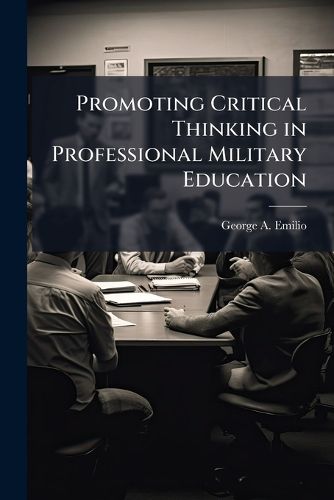Readings Newsletter
Become a Readings Member to make your shopping experience even easier.
Sign in or sign up for free!
You’re not far away from qualifying for FREE standard shipping within Australia
You’ve qualified for FREE standard shipping within Australia
The cart is loading…






Critical thinking (CT) is important to professional military education (PME) because it provides a powerful tool to operate in a complex, changing world. Unfortunately, the teaching of such skills has been woefully ignored in American education. This paper examines common elements of successful nation-wide CT programs to develop a simple academic assessment checklist. The checklist is used to assesses the CT curriculum of the United States Air Force's Air Command and Staff College (ACSC) a PME program for mid-level officers. The Air Force's ACSC CT curriculum has made great strides in improving the cognitive skills of its student body but is still in its infancy. Assessment of the school's program showed that, while some skills and behaviors are taught, the list is far from complete when compared to other nation-wide programs. Furthermore, CT standards, testing, and faculty development efforts are still incomplete.
This work has been selected by scholars as being culturally important, and is part of the knowledge base of civilization as we know it. This work was reproduced from the original artifact, and remains as true to the original work as possible. Therefore, you will see the original copyright references, library stamps (as most of these works have been housed in our most important libraries around the world), and other notations in the work.
This work is in the public domain in the United States of America, and possibly other nations. Within the United States, you may freely copy and distribute this work, as no entity (individual or corporate) has a copyright on the body of the work.
As a reproduction of a historical artifact, this work may contain missing or blurred pages, poor pictures, errant marks, etc. Scholars believe, and we concur, that this work is important enough to be preserved, reproduced, and made generally available to the public. We appreciate your support of the preservation process, and thank you for being an important part of keeping this knowledge alive and relevant.
$9.00 standard shipping within Australia
FREE standard shipping within Australia for orders over $100.00
Express & International shipping calculated at checkout
Critical thinking (CT) is important to professional military education (PME) because it provides a powerful tool to operate in a complex, changing world. Unfortunately, the teaching of such skills has been woefully ignored in American education. This paper examines common elements of successful nation-wide CT programs to develop a simple academic assessment checklist. The checklist is used to assesses the CT curriculum of the United States Air Force's Air Command and Staff College (ACSC) a PME program for mid-level officers. The Air Force's ACSC CT curriculum has made great strides in improving the cognitive skills of its student body but is still in its infancy. Assessment of the school's program showed that, while some skills and behaviors are taught, the list is far from complete when compared to other nation-wide programs. Furthermore, CT standards, testing, and faculty development efforts are still incomplete.
This work has been selected by scholars as being culturally important, and is part of the knowledge base of civilization as we know it. This work was reproduced from the original artifact, and remains as true to the original work as possible. Therefore, you will see the original copyright references, library stamps (as most of these works have been housed in our most important libraries around the world), and other notations in the work.
This work is in the public domain in the United States of America, and possibly other nations. Within the United States, you may freely copy and distribute this work, as no entity (individual or corporate) has a copyright on the body of the work.
As a reproduction of a historical artifact, this work may contain missing or blurred pages, poor pictures, errant marks, etc. Scholars believe, and we concur, that this work is important enough to be preserved, reproduced, and made generally available to the public. We appreciate your support of the preservation process, and thank you for being an important part of keeping this knowledge alive and relevant.